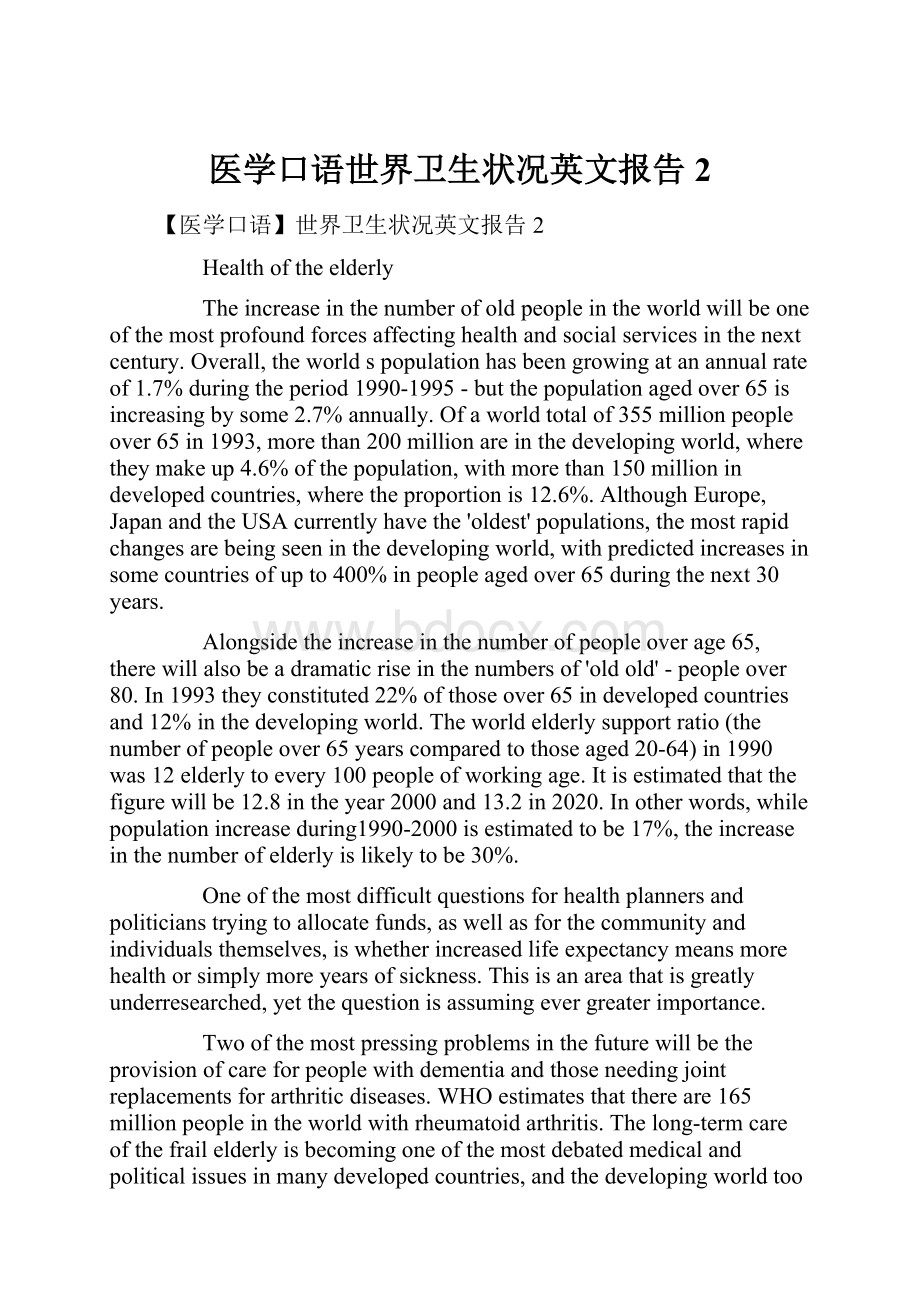医学口语世界卫生状况英文报告2.docx
《医学口语世界卫生状况英文报告2.docx》由会员分享,可在线阅读,更多相关《医学口语世界卫生状况英文报告2.docx(6页珍藏版)》请在冰豆网上搜索。

医学口语世界卫生状况英文报告2
【医学口语】世界卫生状况英文报告2
Healthoftheelderly
Theincreaseinthenumberofoldpeopleintheworldwillbeoneofthemostprofoundforcesaffectinghealthandsocialservicesinthenextcentury.Overall,theworldspopulationhasbeengrowingatanannualrateof1.7%duringtheperiod1990-1995-butthepopulationagedover65isincreasingbysome2.7%annually.Ofaworldtotalof355millionpeopleover65in1993,morethan200millionareinthedevelopingworld,wheretheymakeup4.6%ofthepopulation,withmorethan150millionindevelopedcountries,wheretheproportionis12.6%.AlthoughEurope,JapanandtheUSAcurrentlyhavethe'oldest'populations,themostrapidchangesarebeingseeninthedevelopingworld,withpredictedincreasesinsomecountriesofupto400%inpeopleagedover65duringthenext30years.
Alongsidetheincreaseinthenumberofpeopleoverage65,therewillalsobeadramaticriseinthenumbersof'oldold'-peopleover80.In1993theyconstituted22%ofthoseover65indevelopedcountriesand12%inthedevelopingworld.Theworldelderlysupportratio(thenumberofpeopleover65yearscomparedtothoseaged20-64)in1990was12elderlytoevery100peopleofworkingage.Itisestimatedthatthefigurewillbe12.8intheyear2000and13.2in2020.Inotherwords,whilepopulationincreaseduring1990-2000isestimatedtobe17%,theincreaseinthenumberofelderlyislikelytobe30%.
Oneofthemostdifficultquestionsforhealthplannersandpoliticianstryingtoallocatefunds,aswellasforthecommunityandindividualsthemselves,iswhetherincreasedlifeexpectancymeansmorehealthorsimplymoreyearsofsickness.Thisisanareathatisgreatlyunderresearched,yetthequestionisassumingevergreaterimportance.
Twoofthemostpressingproblemsinthefuturewillbetheprovisionofcareforpeoplewithdementiaandthoseneedingjointreplacementsforarthriticdiseases.WHOestimatesthatthereare165millionpeopleintheworldwithrheumatoidarthritis.Thelong-termcareofthefrailelderlyisbecomingoneofthemostdebatedmedicalandpoliticalissuesinmanydevelopedcountries,andthedevelopingworldtoowillsoonhavetowrestlewithit.Ifpeoplearenottobeleftdestituteanduncaredforattheendoftheirlives,moreattentionmustbegiventosocialmechanismsforthesupportoftheelderlyandthemeanstofundthem.
Generalhealthissues
Althoughinthepast10yearstherehasbeenaglobaltrendtowardsthedemocratizationofpoliticalsystems,themuchanticipated'peacedividend'hasfailedtomaterialize.Povertyhascontinued,andwillcontinue,tobeamajorobstacletohealthdevelopment.Thenumberofpoorpeoplehasincreasedsubstantially,bothinthedevelopingworldandamongunderprivilegedgroupsandcommunitieswithindevelopedaswellasdevelopingcountries.Duringthesecondhalfofthe1980s,thenumberofpeopleintheworldlivinginextremepovertyincreased,andwasestimatedatover1.1billionin1990-morethanone-fifthofhumanity.
Thechangingdemographicpictureacrosstheworld,togetherwiththerapidshifttowardsurbanization,willhaveprofoundimplicationsforthedeliveryofhealthservices.Theunplannedandoftenchaoticgrowthofmegacitiesinthedevelopingworldwillposeparticularchallenges,aspoorsanitationandhousingencouragethespreadofinfectiousdiseases.
Againstanyoptimismabouttheglobaleconomythroughouttheremainderofthiscenturyandbeyondshouldbesetanumberofmajoruncertainties.Therehasbeenadisproportionateflowofresourcesfromthedevelopingtothedevelopedworld-poorcountriespayingmoneytorichones-becauseofdebtservicingandrepaymentandasaconsequenceofpricesforrawmaterialsthatfavourthelatterattheexpenseoftheformer.Structuraladjustmentpoliciesaimedatimprovingtheeconomicperformanceofpoorcountrieshaveinmanycasesmadethesituationworse.ThewordsofRobertMcNamara,spokenin1980whenhewasPresidentoftheWorldBank,stillholdtrue:
'Thepursuitofgrowthandfinancialadjustmentwithoutareasonableconcernforequityisultimatelysociallydestabilizing'.
Afurtherworryingglobaltrendisgrowingunemployment,especiallyindevelopingcountrieswithoutsocialsecurityarrangementstocushionthoseoutofwork.Long-termunemploymentiscreatinganewclassof'untouchables'-byexcludingalargegroupofpeoplefromthemainstreamofdevelopmentandsociety.Theunemployedareapotentreminderofthedangersofassumingthatthegeneralprosperityofacountrywilltrickledowntoallitsmembers.
Thereisalsoconsiderableconcernabouttheadversehealtheffectsofcontinuingenvironmentaldegradation,pollutionandtheuncontrolleddumpingofchemicalwastes,diminishingnaturalresources,depletionoftheozonelayerandpredictedglobalclimatechanges.
Socialmoresarealsoundergoingprofoundchanges,withamovetowardsshortermarriagesandmoredivorcesinmanycountries,leadingtofamilybreakdownswhichhaverepercussionsforindividualsandforsocialservicesthatmaybecalledontoprovidehelpforchildrenandsingleparents.
Beyondanyconsiderationsforimprovingthehealthoftheworldmustbetherecognitionthatthegrowingworldpopulationwillstraintothelimittheabilityofsocial,political,environmentalandhealthinfrastructurestocope.Healthinfrastructure-buildingsandequipment,thestaff,thedrugs,thevehicles-iscentraltogoodhealthcare.Servicesmustbeintegrated,cost-effectiveandprovidedascloseaspossibletothepeoplewhoneedthem.
Withhealthresourcesunlikelytobegreatlyincreasedbutwithevergrowingdemandsforservices,becauseofexpandingpopulationsandtheadvancesofsciencewhichmakemoreconditionstreatable,thedebateabouttherationingofhealthcare,withtheattendantethicalproblems,islikelytobecomeintense.Hardchoiceswillhavetobemade-andgreatlyenhancedmechanismsfoundforlisteningtothevoiceofthehealthconsume
WHO'scontributionstoworldhealth
Withintheframeworkoftheorganizationsconstitutionandtheguidancegivenintheperiodicgeneralprogrammesofwork,allWHOactivitiesaregearedtorespondtothepriorityproblemsoftheagegroupsreferredtointhissummary.ThefullextentofWHO'sworkatnational,regionalandgloballevelscannotbereflectedhere,butexamplesaregivenofdifferenttypesofaction.
Childandadolescenthealth
WHOencouragesself-relianceofcountriesinconductingimmunizationthroughbasichealthservices.ItcooperateswithUNICEFinitsinitiativeofsupplyingvaccinestoover100countries.Majorprioritiesaretoatleastsustaintheaccomplishmentsofpreviousyearsandtocontinuetostriveforachievementofthe1992WorldSummitforChildrengoalofimmunizationagainstthesixvaccine-preventablediseases(diphtheria,pertussis,tetanus,measles,poliomyelitis,tuberculosis).
Inanefforttomakethebestuseoflimitedresourcestoeliminateneonataltetanus,WHOhasgivenprioritytocountriesthataccountfor80%oftotalcasesandhaveanestimatedmortalityof5ormoreper1000livebirths.WHOinitiatedaseriesofmeasurestoarrestthespreadofdiphtheriaineasternEurope,includingtheformulationofaplanofactionandtheestablishmentofaEuropeantaskforce.In1993progresstowardsthepoliomyelitiseradicationgoalwasheartening.Effortsarebeingmadetodevelopamoreheat-stablepoliovirusvaccinethatcanbedeliveredwithalessrigorouslymaintainedcoldchain.Largedonationsforpoliomyelitiseradicationwerecoordinatedwithdifferentorganizations.In1994theregionoftheAmericascommitteditselftoeliminatingmeaslesbytheyear2000,andincidenceisnowatthelowestlevelever.IfthemomentumissustainedtheAmericasmaywellleadthewaytowardsglobaleliminationofthismajorkillerofchildren.
Bytheendof1994virtuallyalldevelopingcountrieshadimplementedplansofactionagainstdiarrhoealdiseasesinchildren.Nearly42%ofhealthstaffinthecountrieshadbeentrainedinsupervisoryskillsusingmaterialsdevelopedbyWHO,andalmost30%ofdoctorsandotherhealthworkershadbeentrainedindiarrhoeacasemanagement,manyoftheminthemorethan420diarrhoeatrainingunitsestablishedinover90countries.Itisestimatedthatnearly85%ofthepopulationofthecountrieshadaccesstooralrehydrationsaltsattheendof1994.
ParticularemphasisisgiventotraininginthemanagementofacuterespiratoryinfectionsWHOsupportscoursesforworkersinfirst-levelhealthfacilitiesandreferralhospitalsonstandardcasemanagement,anddistributestrainingandtechnicalmaterials.Morethan190000healthmanagers,doctors,nursesandcommunityhealthworkersinover60countrieshavebeentrainedsofar.WHOisinvolvedinnumerousstudiesonacuterespiratoryinfectionsinAfrica,AsiaandLatinAmerica.
Activitiesforbetternutritionarepromotedin62countries,mostlyincollaborationwithFAOandUNICEF.Aglobaldatabaseonchildgrowthwasestablishedandmorethan90countriesarereceivingtechnicalandfinancialsupporttogiveeffecttotheInternationalCodeofMarketingofBreastmilkSubstitutes.ThenewWHO/UNICEF'baby-friendlyhospitalinitiative'hasprovedhugelysuccessfulinencouragingproperinfantfeedingpractices,startingatbirth.Ithasalreadybeenimplementedintwo-thirdsofAfricancountries.AnumberofcountrieshaveintroducednationalnutritionpolicieswithWHOsupport.
AwiderangeofWHOprogrammesfocusontheneedsofadolescentsinsuchfieldsasnutrition,mentalhealth,sexuality,diseaseandinjuryprevention,andsubstanceabuse.